“Ugh, why do I feel guilty after eating!?!”
If you’ve ever had this thought, you’re not alone.
Food guilt often stems from our deeply ingrained beliefs—whether it’s from diet culture, past dieting experiences, or personal expectations about what and how much you “should” eat.
You might feel guilty after eating because you believe you’ve broken a rule, eaten too much, or made an “unhealthy” choice.
But food is not something to feel ashamed of—it’s meant to nourish, fuel, and be enjoyed. If you find yourself regularly experiencing food guilt, let’s explore the reasons behind it so you can start developing a healthier, more balanced relationship with food!
Written by Jenn Hand, Holistic Nutritionist, Board Certified Health Coach, NBC-HWC
My “Guilting Eating” Backstory
Food guilt used to consume my life.
I used to feel guilty ALL the time, especially when I ate foods that I considered “bad” or “off-limits.” It was a feeling that crept up during and after meals—whether I had a second helping or indulged in something sweet.
Anytime I ate bread or pasta, anytime I ate after my “no eating after 7pm rule,” or anytime I decided I had “too many” cookies/pieces of pizza/candy/etc, the guilt snuck in with a vengeance.
Over time, I began to notice the cycle: restricting foods, feeling deprived, overeating, then feeling guilty.
It was exhausting and emotionally draining.
As I started practicing listening to my body, softening food rules, and letting go of my good/bad labels bit by bit, the guilt softened.
It didn’t happen overnight, but over time, I begin to allow all foods and trust myself to follow my body’s needs.
10 Reasons Why You Feel Guilty After Eating and How to Deal
Why Do I Feel Guilty After Eating??
Feeling guilty after eating is more common than you might think.
But you can begin to soften and let go of this guilt.
If you find yourself experiencing food guilt regularly, it’s important to explore the deeper reasons behind it. Here are 10 reasons why you may feel guilty after eating and how to stop food guilt from controlling your relationship with food.
1. You Label Foods as Good or Bad
When you classify foods as “good” or “bad,” eating is filled with judgment and criticism rather than a normal part of life.
This mindset creates unnecessary guilt when you eat something considered “bad,” even if it’s something your body craves or enjoys. Instead of labeling food, see if you can explore more neutral words like energizing, nourishing, satisfying, or nutritious.
Is pasta energizing? Do veggies feel nourishing? Does ice cream bring satisfaction? There’s no right or wrong, just how each food feels in your body!
2. You Have Unhelpful Food Rules
I used to have a very long list of food rules. I thought these kept me “in control” but in reality, they often set me up for a binge.
Strict food rules—such as “no carbs after 6 p.m.” or “dessert is only allowed on weekends”—set us up for failure. These rigid expectations make it impossible to be flexible, and when we inevitably break a rule, we feel guilty or like we’ve lost control.
Instead of following arbitrary guidelines, try questioning and challenging these rules that keep us stuck and feeling guilty!
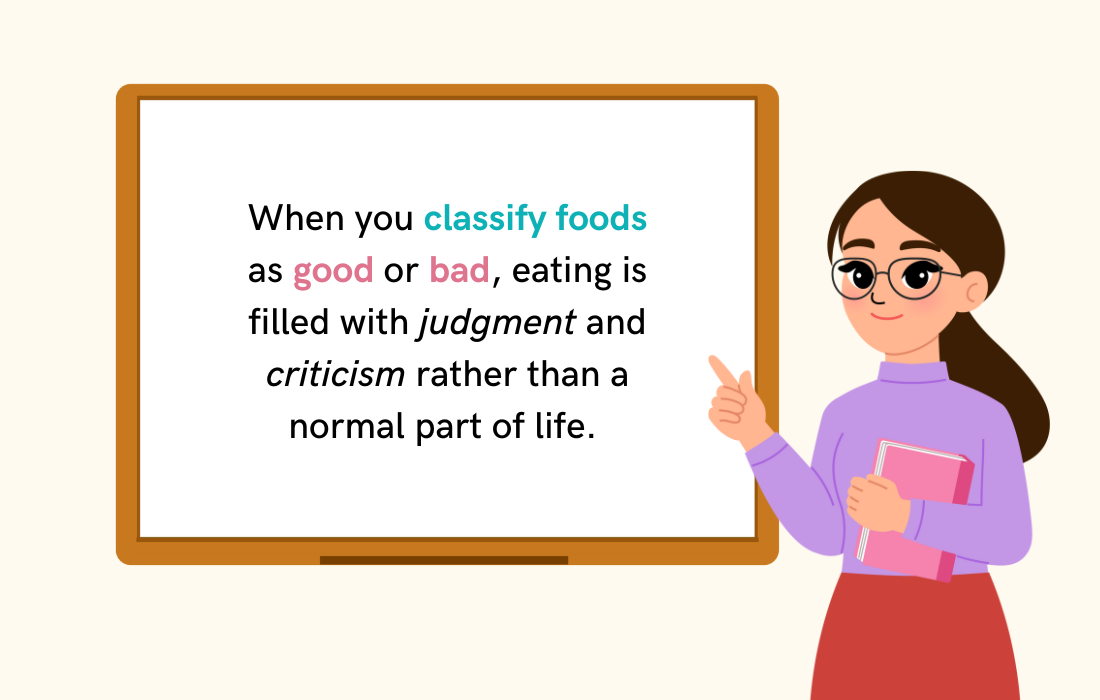
3. You’re Restricting Certain Foods
Cutting out specific food usually backfires, leading to intense cravings and, eventually, binge eating.
When you finally eat the forbidden food, you may feel out of control, which only fuels more food guilt. Instead of strict avoidance, allow yourself permission to enjoy all foods.
Experiencing food guilt after eating something you’ve been avoiding is a sign that your body may need a more balanced and sustainable approach to eating.
4. You Eat More Than You Planned
Overeating happens—it’s part of being human.
Whether it’s a holiday meal, a night out, or simply a moment of distraction, eating more than intended can trigger feelings of guilt. However, one meal or one day of eating more than usual does not determine your overall physical and mental health.
Practicing mindful eating can help you check in with your body, but it’s also important to remind yourself that occasional overeating is normal and doesn’t need to lead to self-criticism.
5. You’re Seeking Control Through Food
Raising my hand for this one! When my life felt out of control, I used to use food as my means of feeling in control.
Food can feel like an easy way to gain control when life feels chaotic, but when eating doesn’t provide the emotional relief we hope for, it can leave us feeling guilty.
It’s important to understand that controlling our food is an illusion. We never really feel in control, and it’s only by learning to let go and trust our bodies that we DO end up feeling in ‘control.’ (A paradox, I know!)
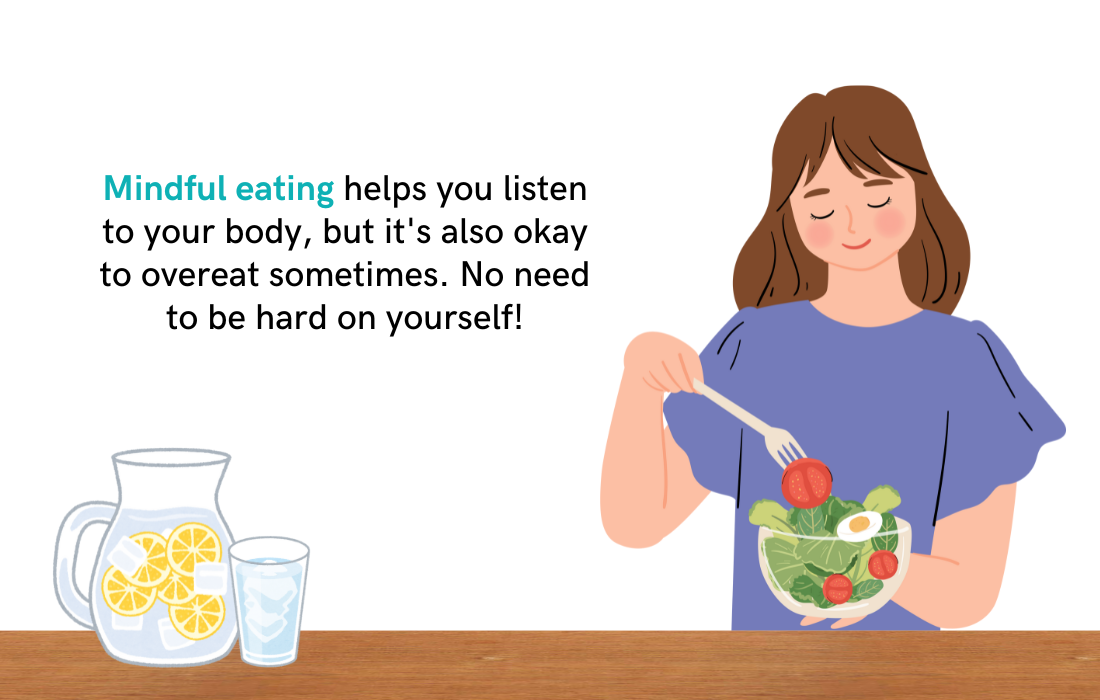
6. You’re Dealing with Societal and Cultural Pressures
Diet culture pushes the idea that only certain foods are “healthy” and that your worth is tied to your size.
Social media, family influences, and cultural expectations can make you second-guess your food choices, leading to guilt when you don’t eat “perfectly.” But no single food determines your health, and eating should be about nourishment and enjoyment, not restriction.
Letting go of external pressures allows you to make choices based on what feels good for your body—not what society says you “should” eat. Pay attention to what and “who” you allow into your life via social media and content you consume. Surround yourself with a balanced view of food and health!
7. You’re Eating for Emotional Comfort
When we don’t learn how to cope with life and emotions when we grow up, food becomes a coping mechanism.
But if it’s our only way to manage stress, sadness, or boredom, guilt can creep in afterward. Rather than blaming yourself, consider what emotions you’re trying to soothe when stress eating and what else might help. Comfort eating isn’t inherently bad—it becomes an issue when it leaves you feeling worse instead of better.
Expanding your coping tools, like movement, deep breathing, or reaching out to someone you trust, can help food feel less tied to your emotions.
8. You’re Working Through Underlying Body Image Issues
If you struggle with a negative body image, you might feel like your food choices are a reflection of your worth.
You may feel guilty when you eat something you perceive as “unhealthy” or when you think you’ve eaten too much. But food is not a measure of discipline or morality—it’s fuel and pleasure.
Learning to respect your body, regardless of size, can help ease the pressure around eating and allow you to make choices from a place of care instead of criticism.
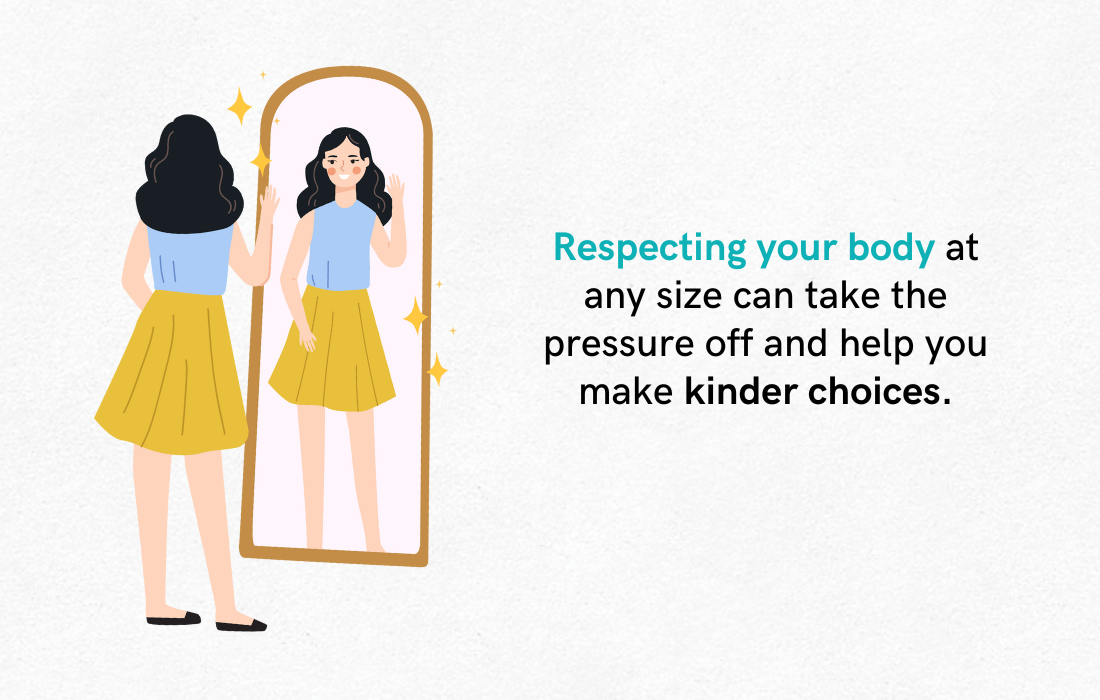
9. You’re Comparing Your Eating to Others
It’s easy to feel like you should eat less because your friend ordered a salad or guilty because you ate more than someone else.
But everyone’s needs are different—what works for one person may not work for you. Instead of measuring your choices against others, focus on what feels satisfying and energizing for you. The more you trust your own hunger and fullness cues, the less you’ll feel the need to compare. This is something I continue to work on!
Sometimes I’ll eat the same amount as my husband and get in my head. But I know I’m tuning into my needs, so remind myself that I CAN trust the cues and wisdom.
10. You Haven’t Learned Intuitive Eating or Balanced Eating Yet
If you’ve spent years following diets or food rules, it’s natural to feel guilty when you eat more “freely.”
Without a structured plan telling you what to do, you might worry you’re doing it “wrong.” But learning to eat intuitively—listening to your body’s hunger, fullness, and cravings—helps you develop a sense of trust. Over time, food choices become less stressful, and eating becomes an enjoyable, guilt-free experience.
🌷 Related Post: Does Intuitive Eating Work for Everyone? My Experience with Intuitive Eating
When to Seek Help for Food Guilt and Emotional Eating
If food guilt is interfering with your daily life, causing distress, or leading to disordered eating, it may be time to seek professional support.
A therapist, dietitian, or intuitive eating coach can help you break free from negative emotions around food and build a healthy eating pattern. You don’t have to struggle alone and sometimes support is the best way to move forward faster!
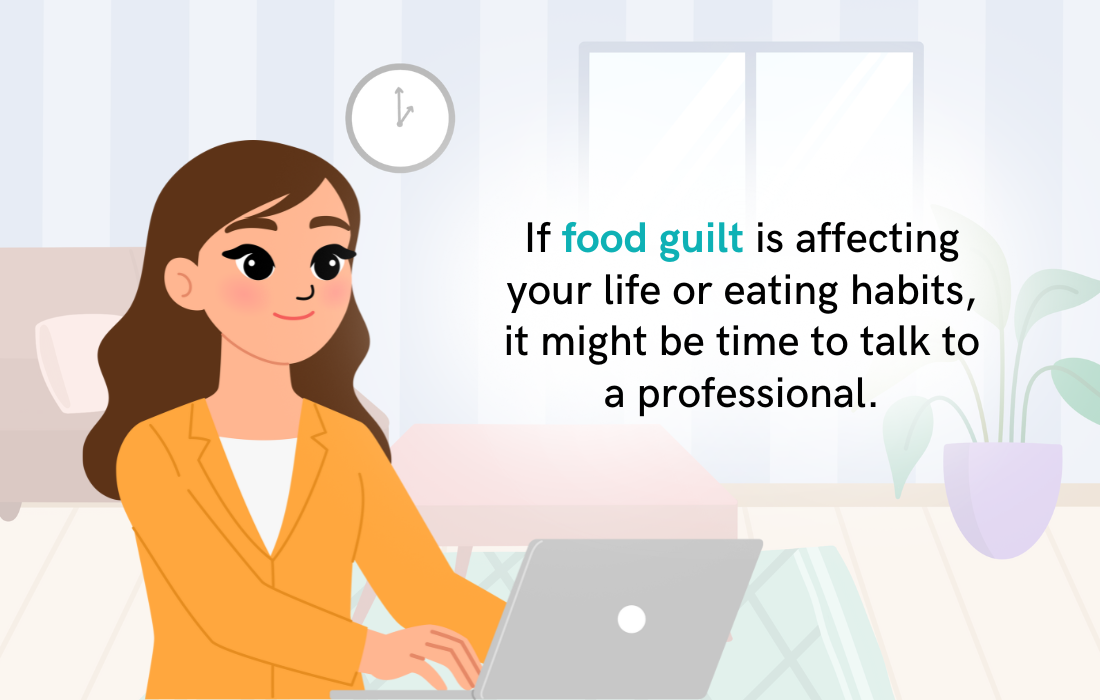
Common Questions
Is it bad to feel guilty after eating food?
Feeling guilty after eating isn’t inherently “bad,” but it can signal a complicated relationship with food.
Instead of judging yourself, try to explore where the guilt is coming from and how you can shift your mindset.
How do I stop feeling guilty after eating certain foods or overeating?
Start by challenging the beliefs that label foods as “good” or “bad.”
What if food was neutral and you just explored how each food felt in your body? Remind yourself that one meal doesn’t define your health, and focus on listening to your body’s needs rather than external food rules.
Can food guilt make it harder to lose weight?
Yes, food guilt can lead to a cycle of restriction and overeating, making weight loss more challenging.
When you approach food with less guilt and more trust, your body can find its natural balance more easily.
Why do I feel like I can’t lose weight no matter what I do?
If you’ve been dieting for years, your body may be stuck in survival mode, holding onto weight due to past restriction.
Also despite what we’re taught in the diet world (eat less + move more = weight loss), weight is actually very complex. Genetics, stress, hormones, muscle mass, lifestyle and more can all impact weight.
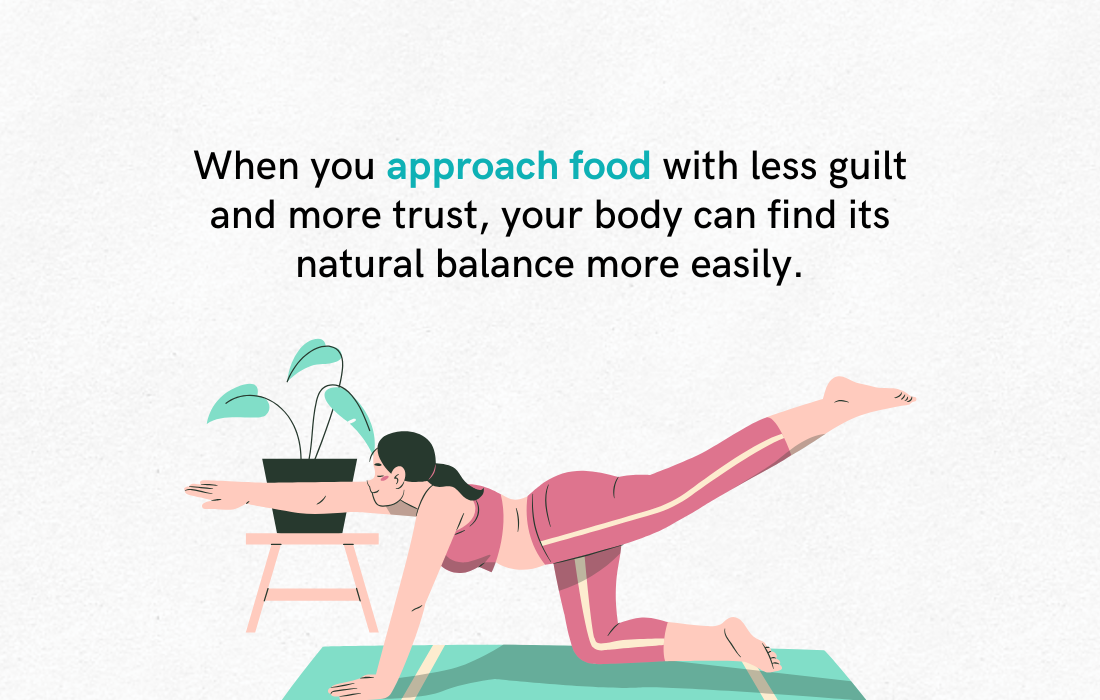
Is food guilt a sign of an eating disorder?
While feeling guilty about food isn’t always a sign of an eating disorder, persistent guilt, anxiety, or food obsession can be red flags.
If food guilt is interfering with your well-being, it may be worth exploring with a professional.
What is healthy eating, anyway?
Healthy eating isn’t about perfection—it’s about nourishing your body in a way that feels good physically, mentally, and emotionally.
It’s about balance, flexibility, and honoring your hunger and cravings without rigid rules.
Can food guilt cause a strain on your mental health?
Yes. Constant guilt around food can increase stress, anxiety, and even lead to disordered eating behaviors.
Letting go of food guilt creates more mental space for joy, connection, and true well-being.
What are some healthy eating habits than can help me overcome food guilt and overeating?
Focusing on mindfulness, eating a variety of foods without judgment, honoring hunger and fullness cues, and allowing yourself to enjoy all foods in moderation can help break the guilt cycle.
What is “disordered eating?” And is it related to food guilt?
Disordered eating refers to irregular or unhealthy eating behaviors, like chronic dieting, food restriction, or bingeing.
Food guilt can be a symptom of disordered eating, reinforcing cycles of shame and restriction.
Related Articles
⚪ What Is a Healthy Dessert for Weight Loss?
⚪ How Can Anger Affect Eating Habits?
⚪ What Is Holistic Weight Loss?
Get the Normal Eater’s Newsletter
Join 8000+ women who are overcoming overeating, binge eating, and breaking up with dieting forever. Get Jenn’s inspiring and actionable weekly newsletter with the latest posts, podcasts, and tips on how to love your body, find food freedom, and lose weight holistically.
Get the Normal Eater’s NewsletterWork with an Emotional Eating & Holistic Nutrition Coach
Overcome Bingeing and Emotional Eating and Break Up with Yo-yo Dieting
Working with an emotional eating coach and holistic nutritionist can help you get free from the frustrating binge and restrict cycle and stop yo-yo dieting.
You don’t have to be obsessed with food or have a million rules around eating to find your natural weight and learn to love your body. Ready to actually see a lasting change and experience true freedom?
Schedule a 20-min CallAbout the Author:

Jenn Hand has been helping women like you become normal eaters since 2015.
She’s worked with thousands of women, helping them to balance their bodies, end bingeing, stop obsessing over food, and start feeling amazing again. As a board-certified health coach and holistic nutritionist, Jenn knows how to support you in making real positive changes that last.
Her articles have been published on Mind Body Green, Tiny Buddha, Thrive Global and other local and global media platforms. She’s the author of How to Be a Normal Eater and the creator of The Normal Eater’s Club program. Listen to Jenn’s advice and tips on the Cake Doesn’t Count Podcast, or read more of her articles for free on the Food Freedom Blog.
Learn About Coaching!




